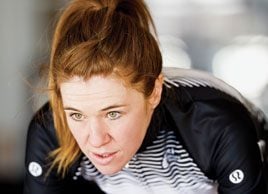Q & A with Olympian Clara Hughes
We talked to Clara Hughes about her personal life, and her passion for giving back

Source: Best Health Magazine, May 2012; Photo courtesy Robertson/Velodramatic
The first thought I had on seeing Clara Hughes in the flesh, in California at her training camp just before Christmas, was, Wow, she’s tall. (I hadn’t realized she is five foot nine.) She was coming into the hotel lobby after a ride in the mountains with her cycling team. Someone called out, ‘Hey, Clara, how far did you go?’ She tossed her reply casually over her shoulder, her red hair swinging back: ‘Oh, 200K.’ The guy’s jaw dropped as she skipped up the stairs with her bike in one hand.
Clara Hughes hardly needs an introduction, so maybe this will do: She’s awesome! Not enough? Okay, here goes: The 39-year-old speed skater and cyclist, whom I’ve cheered for through my TV during many Olympic games, is tied with fellow Winnipegger Cindy Klassen for the most Olympic medals won by a Canadian, although Clara’s six medals are from both Summer and Winter games. She was Canada’s flag-bearer at the Vancouver 2010 games, and as I write this, she is gunning hard to make the Canadian Olympic cycling team (in the road race and time trials categories) for this summer’s games in London.
And competitors had better get out of her way, because although the long, lean Clara has a laid-back and friendly attitude when she’s not competing, I can tell you from experience that once she’s in race mode’or even talking about racing and winning’you can see from the intensity in her green eyes that she is absolutely driven. During our interview later, I asked her about what it’s like in the heat of a skating or cycling race.How does she keep going when her brain is convinced she can win but her body is screaming and at its limit? ‘My brain makes unreasonable requests of my body,’ she admits. ‘My brain’s job is to try to overrule my body. My best race times are when they work as one. I try to achieve a mind-body oneness’just doing and being.’
The thing about Clara, though, is that her passion extends way, way beyond winning medals. She is a rare generous soul who feels strongly that she can use her success in sport to help others, and she’s doing that in wonderful ways. One is her willingness to share her story of struggling with depression, to help get people talking about mental illness and therefore reduce the stigma. Another way is her generosity to charitable organizations, including Right To Play (RTP). (Based in Toronto, RTP is an international humanitarian organization started by Norwegian speed-skating legend Johan Olaf Koss. It uses sport programs to improve health, develop life skills and foster peace for children and communities in disadvantaged countries.) For example, when Clara won a gold medal in the Turin Winter Olympics in 2006, she donated $10,000 of her personal earnings to RTP’and this was before Canada was giving medal bonuses. But for Clara, it’s not enough just to give money. She has travelled with RTP to Ethiopia, and was in Mali last fall with Canadian kayaker Adam van Koeverden playing with kids and leading them into fun and games.
I interviewed her over a couple of days during her training camp in Carlsbad, California, this past December. She was there with her road team, sponsored by Specialized bikes and Lululemon. The team consists of 13 of the world’s best women cyclists from places like Germany, Sweden, the United States and Australia, and together they compete on the racing circuit. (Whoever qualifies for the Summer Olympics will race for her own country.) ‘Yes, I am the oldest one on this team,’ Clara remarked, ‘but I feel stronger than ever.’ That strength shows; I overheard a number of her international team members say how much they are inspired by and look up to her.
She has the qualities of a true leader. In an RTP learning session that was held at this team training camp, Clara spoke passionately to her fellow team members: ‘Let’s do more than just put Right to Play on our jerseys. We can show that we are more than just athletes. What makes a champion isn’t how many medals are hanging around our necks. So many people have these medals, and all they do is show them off to people. We’re better than that. I just feel in my gut it’s the right thing to do. Anything is possible, but it’s up to us to do it.’
Clara lives with her husband, Peter Guzman, and they divide their time between two homes: one in the Eastern Townships in Quebec, and the other deep in the mountains of northeast Utah. They share a passion for being surrounded by nature in the precious times they get to be together. ‘(Clara says in the past five years, she has spent no more than three weeks at a time in one place.)
Bonnie’s one-on-one with Clara Hughes
Bonnie: Do you think the fact that the 2010 Olympics were in Canada inspired kids across our country?
Clara: I don’t think it, I know it, just like Calgary did for me. Seeing Gaetan Boucher win at speed skating in Calgary meant so much to me. I’ll never forget that moment in 1988’it still gives me chills and I still have that passion.
Bonnie: You were kind of a ‘bad girl’ at the time, right?
Clara: My parents split up when I was nine, and my mom raised my sister and me alone. We were wild animals, untamed. We made some bad choices’drugs, smoking. I quit school for a bit. As a teenager, being cool was all I wanted to be’that’s the only thing that mattered’and that meant being bad. So one day I was at home watching TV, flipping channels, and I saw Gaetan Boucher skating. I knew about the Olympics but I didn’t care about them. But I saw his intense expression, and that’s the moment I just knew what I wanted to do. And I knew that to do it I’d have to improve myself in all ways’go to school, for one. No exaggeration: This saved my life [shaking her head]. I can’t believe where my life has gone since then.
I try to share that story as much as possible, to show that people can change, and to get parents to get kids into anything the kids are interested in’it could change their lives, too. Parents tell me all the time that I’m inspiring their kids, and I think that’s the coolest thing on earth. It’s always been my goal to be that inspirational person.
Bonnie: Does that feel like a lot of pressure?
Clara: While I’m competing, I always think, whether I win or lose, how am I presenting myself? What am I saying or doing? What will the kids be thinking, and how will that affect their little hearts and minds? Five, 10, 15 years from now I can’t wait to hear about kids who were inspired by me.
Bonnie: Tell me more about getting into sports when you were a girl.
Clara: After I saw Boucher, my mom called the provincial speed-skating association. There was a short-track camp one weekend, and I did it in my hockey skates, since I already played ringette. I got my ass kicked. So my grandma gave me a pair of speed skates but they were long-track; I sold them and bought a pair of short-track skates.
Then I got into cycling. I left home at 18. I’ve supported myself through sport ever since, through little victories. For example, in my first biking race I won $850 for eighth place, and was top in Manitoba.
Bonnie: Are you close with your parents and sister?
Clara: My sister is a mom; she’s in Winnipeg. We couldn’t be more opposite. My mother and I are very close, and she’s a role model for me. She is basically a saint; she cares for my grandmother at home. But my dad has always supported people around him, too. As a professor and an art collector, he was always commissioning art from struggling artists; that’s benevolence. So what I do comes from him, too.
Bonnie: What has your involvement in Right to Play meant to you?
Clara: The first time I was in Ethiopia, it was overwhelming. I knew poverty existed but had never seen it. I started kicking a ball with these little boys. They deserved to be having fun. They just work all the time; they should laugh.
The kids we help through RTP, they get a sparkle in their eyes, a light, and it’s what happened to me when I saw Boucher. When I’m on that bike and sprinting against a com-petitor, I have so much fun. RTP sets the stage to make it okay to have fun, even for disabled people and girls.
There was this kid in Ethiopia who’d had his hand blown off by a land mine. He had wanted to kill himself. RTP gave him the skills and training to coach other kids on a team. He stopped hiding his stump, and after being a coach, today he has the ambition to be a lawyer. You have to make sure kids have the seed of hope.
Bonnie: When did your struggles with depression start?
Clara: After the 1996 Olympics, I suffered two years of depression. I had just come off competitive success, was probably over-training, and I cracked mentally and physically. My future husband, Peter, came into my life at that time, and I was also fortunate to have the support of my team doctor. The doctor demystified it for me and told me what I needed to do and said, ‘We’re here for you.’
Now I’m open about it because for most people, the support isn’t there. I’m an athlete; I’m lucky I have someone to keep an eye on me. It’s a vicious cycle. Society doesn’t support mental illness. Many people say, ‘Just get over it,’ but it’s not that easy. Talking about it is the first step to getting better.
I used to wonder at the time, ‘Why me?’ Now I know why: because I’m in a position to help others by talking about it. Since the Bell Let’s Talk campaign started in 2011, people come up to me all the time to thank me for telling my story, and they hug me. Sharing my success to help break the stigma is so important to me, and it’s working.
Bonnie: Did you ever consider suicide?
Clara: I have friends who tried it and failed. I didn’t try it. I wouldn’t say I was suicidal, but I did have moments when I felt I didn’t want to be here anymore.
My struggles aren’t completely behind me; it’s still always there. It’s terrifying when I feel low, so I talk to someone who can prevent me from dragging down any lower. I speak to a sports psychologist or my husband. People keep me honest about it!
Bonnie: What is your husband like?
Clara: Peter is absolutely the person for me, and I’m so lucky to share my life with him. He is the person I’m closest to. He’s my rock; he brings me back to the light. He’s American and now also a proud Canadian. He’s an adventurer’like Survivorman but without the TV show. For example, Peter walked the Continental Divide solo from Mexico to Canada; it took him seven months, walking 45 miles a day with a backpack. And he kayaked from Washington State to Skagway, Alaska’also solo. Peter does his trips just for himself. And he’s an amazing writer; I have a shoebox of handwritten letters from his trips.
He’s a beautiful man. We challenge each other, and we have a unique lifestyle, living in remote places. I value the energy we have to live the lives we love. If we can be outdoors, that’s where we’ll be. No TV, although we have Sirius satellite now and listen to CBC radio [laughs].
Bonnie: Do you think you’ll have kids?
Clara: No. I feel like I have kids all over the world’now I have hundreds in Mali! Seriously, though, I just don’t have that desire. And my husband isn’t interested either. I love kids, but other people’s kids. Never say never’but I’m pretty darned sure!
Bonnie: So do you feel there’s a promising up-and-comer we should watch for in the next Olympics, in any sport?
Clara: [She shrugs and looks a bit surprised.] I don’t know. [Now her eyes go very intense, and she leans in close, and speaks in a low, steady voice.] People probably don’t know what I can do. And they will be surprised by what I will do.
This article was originally titled "You go, Clara!" in the May 2012 issue of Best Health. Subscribe today to get the full Best Health experience’and never miss an issue!




